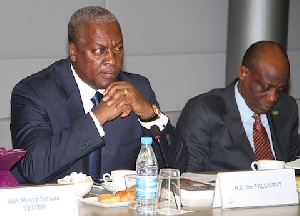The Ministry of Finance and Bank of Ghana (BoG) have vowed to fix volatilities plaguing the economy, and remain adamant that the new controls on foreign currency transactions are the right measures to shore-up the weak cedi.
Finance Minister Seth Terkper, who called a meeting with journalists on Friday to expatiate on how the authorities are confronting economic imbalances that seem to have worsened during the past three weeks, said government will be firm in pursuing policies to manage risks to the economy.
His assurances came after the BoG had announced foreign currency controls in a bid to boost the cedi, which has depreciated by 5.1 percent against the dollar this year. The measures outlawed the use of foreign currency for domestic payments as well as dollar loans by domestic banks to customers who do not earn their income in foreign currency. The central bank also warned that offshore currency dealings by resident companies will be “strictly prohibited”.
“For some who think that these are doomsday measures, they should know that we have had similar measures in the past,” said Mr. Terkper. “It’s important for the nation to adopt best practices [and] to do away with the antiquated practices.”
To support the central bank’s new measures, he said, all government agencies have been asked to cease entering into dollar transactions unless with the explicit approval of the Ministry of Finance. Abuses in the import sector, wherein wrongful valuation of imports tends to distort the pricing of foreign exchange, will also be checked.
Millison Narh, Deputy BoG Governor, said the decision last week to raise the bank’s policy rate by 200 basis points to 18 percent -- together with the foreign exchange controls -- will increase the supply of dollars and stem the cedi’s slide.
“Our economy is growing. In 2006, the value of our imports was US$8billion; last year, it was US$17.3billion. In the same period, exports increased from US$5billion to US$13.5billion. So you can see the huge gap,” he said, adding that “the measures adopted are aimed at providing adequate supply of forex”.
In its monetary-policy statement on Thursday, the BoG urged the Ministry of Finance to stick to its fiscal targets, rationalise the public sector wage bill, and review agreements with certain multinationals that are allowed to retain their export earnings abroad.
“In the medium- to long-term, government must seek to broaden the tax base further; diversify and broaden the export base; reduce imports, especially of consumption goods that have local substitutes; and intensify efforts to block foreign exchange leakages such as transfer pricing,” Governor Henry Kofi Wampah said.
Mr. Terkper refrained from saying whether government will meet its 2013 budget deficit target of 10.2 percent of GDP, but stressed that expenditure management reforms, including efforts to rein in the spiralling wage bill, have been intensified.
He said the Finance Ministry is also analysing third quarter GDP data issued last month by the Ghana Statistical Service (GSS), which showed that the economy grew by a paltry 0.3 percent year-on-year in the period. The Ministry was surprised by the very low figure, he said, given that the economy had recovered from the energy sector challenges by the beginning of July 2013.
He said government is pursuing value-addition in many sectors, an agenda that will gain impetus from completion of the gas development project in the Western Region. Government, he added, will continue to dialogue with groups that have been affected by 2014 budget policies and the recent actions of the central bank.
Business News of Monday, 10 February 2014
Source: B&FT













